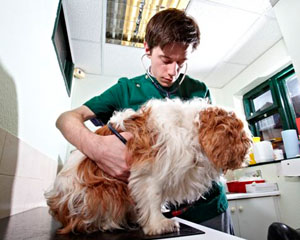04 February 2016
BVA launched its landmark animal welfare strategy at its annual London Dinner
The British Veterinary Association (BVA) has launched its landmark animal welfare strategy at its annual London Dinner (3 February) highlighting the veterinary profession's unique opportunity – and responsibility – to advocate animals' best interests at individual, community and political levels.
Just over 50 years since The Brambell Report (1965), ten years on from the Animal Welfare Acts of 2006 and following 18 months' consultation, BVA President Sean Wensley presented ‘Vets speaking up for animal welfare' to a roomful of key influencers including Defra Minister George Eustice MP, other MPs and Peers, industry representatives, NGOs, journalists, retailers and animal welfare scientists.
BVA's animal welfare strategy provides a framework to help the veterinary profession advocate good animal welfare outcomes for all animals, identifying six priority areas as building blocks for future action:
- Animal welfare assessment
- Ethics
- Legislation
- Education
- Advocacy
- International
Each priority area outlines its aim, evidence gathered through consultation and actions for BVA. Priority area ‘animal welfare assessment' provides a consensus definition of animal welfare and ‘ethics' emphasises veterinary professionals' animal welfare-focus; with their principal duty being to animals, despite also having duties to their clients and the businesses that veterinary surgeons work for. Other priority areas, such as ‘international', highlight veterinary responsibility in ensuring animal welfare is recognised as a key objective within sustainable development and in future systems of environmentally sustainable animal agriculture.
The ultimate aim of BVA's animal welfare strategy is for BVA, its members and specialist divisions to contribute to solutions for real-world animal welfare problems.
Launching the strategy BVA President Sean Wensley said:
“Brambell's report set in motion the now thriving field of animal welfare science – determining how animals perceive the world, and what they need and want from their perspectives - and, in light of this new scientific understanding, society is increasingly examining how we ought to use and treat animals. Protecting and promoting animal welfare is the veterinary profession's raison d'etre: it's a declaration that each of us makes when we become members of the Royal College of Veterinary Surgeons.
“As vets, we recognise that we are part of an interdisciplinary community seeking to promote the best interests of animals and improve their treatment, wherever they are used or impacted on by people. It's a community that includes NGOs, retailers, politicians, scientists, philosophers, economists and all the organisations represented here this evening. Vets' opportunity to be advocates for animals may be the greatest of all those who act in the interests of animals - and we have clear social, professional and legal responsibilities to do so.”
The Vet Futures report, launched last November as part of the ongoing project jointly led by BVA and RCVS, identified veterinary leadership in animal health and welfare as one of the six key ambitions in its 2030 vision for the veterinary profession.
The President concluded his launch of ‘Vets speaking up for animal welfare', saying:
“The launch of BVA's animal welfare strategy sends a clear signal that the veterinary profession is, and will continue to be, a considerable force for good, for animals and for an increasingly compassionate society, in the years to come.”
Download the Animal Welfare Strategy at www.bva.co.uk/Animal-welfare/.



